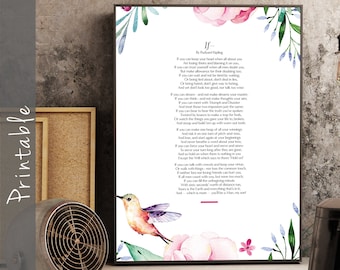


Last year, indignant students at the University of Manchester painted over a mural displaying the verses of “If-” and replaced them with Maya Angelou’s “Still I Rise.” (Were they perhaps channeling Lindsay Anderson’s over-the-top If…, his 1968 film about an insurrection at an English public school?) Student outrage directed at Kipling is understandable. Rudyard Kipling appealing for recruits to join the British Army during World War I, 1915 Today, it is Kipling himself who often faces the public’s wrath. It might surprise the poem’s many enthusiasts to learn that Kipling, who lived for several years in Vermont and built himself a tennis court there ( reputedly the first in the state), originally used “If-” as the epilogue to a story about George Washington and his resistance to public opinion. On International Women’s Day, in 2017, seven-time Wimbledon singles champion Serena Williams made a video in which she read the second half of the poem, substituting for Kipling’s final, patriarchal words an updated message for her daughter, “You will be a Woman, sister!” And a loss? Learn from it and move on.īefore the men’s championship match in 2008, the two finalists, Roger Federer and Rafael Nadal (still seeded second and third this year, more than a decade later), each recorded a recitation of a passage from the poem for a feature to be aired during rain delays.

If you can do all these things, Kipling concludes, “Yours is the Earth and everything that’s in it, / And-which is more-you’ll be a Man, my son!” For a tennis player, the stoic lines swearing off triumph and disaster suggest that winning-even winning a major tournament like Wimbledon-must be kept in perspective.

If you can trust yourself when all men doubt you,īut make allowance for their doubting too… If you can keep your head when all about you The passage is from Rudyard Kipling’s “If-,” once voted Britain’s most popular poem. IF YOU CAN MEET WITH TRIUMPH AND DISASTERĪND TREAT THOSE TWO IMPOSTORS JUST THE SAME The famous quote from Kipling’s poem “If-” above the doors that lead to Wimbledon’s Centre Court, Londonįor these next two weeks, the best tennis players in the world will enter Wimbledon’s fabled Center Court under two lines of poetry inscribed in capital letters above the tunnel that leads from the locker room:


 0 kommentar(er)
0 kommentar(er)
